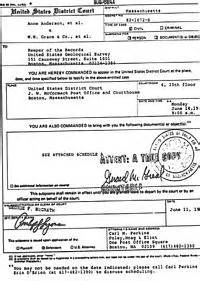In every lawsuit the Plaintiff has the
obligation to notify all defendants that they are being sued. When a
lawsuit is filed the court issues a summons which must be served
(usually with a complaint) on every defendant. Massachusetts and
probably all other states prefer that the person be served in hand or
at least by leaving documents at their home. What happens if you
don't know where they live or work? How do you serve them?
 Every state has laws that allow a
substitute form of service of documents on a person who can't be
located. In Massachusetts, a motion must be filed to serve by an
alternate form of service. If nothing else works, the court can
order service by publishing in a newspaper. Of course, most people
don't read the legal notices in newspapers so service by publication
usually results in no notice at all but would be satisfactory to a
court. In Massachusetts, the courts prefer that a different form of
notification be used. Massachusetts courts now require detailed
affidavits explaining how the Plaintiff searched for a Defendant
including details of searches on the internet. As one clerk told me
internet searches are required unless the Defendant's name is Smith.
Every state has laws that allow a
substitute form of service of documents on a person who can't be
located. In Massachusetts, a motion must be filed to serve by an
alternate form of service. If nothing else works, the court can
order service by publishing in a newspaper. Of course, most people
don't read the legal notices in newspapers so service by publication
usually results in no notice at all but would be satisfactory to a
court. In Massachusetts, the courts prefer that a different form of
notification be used. Massachusetts courts now require detailed
affidavits explaining how the Plaintiff searched for a Defendant
including details of searches on the internet. As one clerk told me
internet searches are required unless the Defendant's name is Smith.
A search for a missing Defendant should
start with a search for a telephone number. A telephone information
request with the telephone company is generally a first step. If
this doesn't work, a similar search on the internet using multiple
search engines (Google, Bing, etc.) should be made. If the person
has a driver's license or professional license then the state data
banks may show a current address for the person. All of these search
methods may show a residence for a missing Defendant. A lawyer can
request confirmation of addresses or forwarding address information
from the post office. A non-lawyer probably would need a court order
authorizing the post office to provide this information from the post
office.
If, after using all of the methods just
described, the person still can't be located, then social media
should be searched. There are too many social media sites to search
them all. At a minimum, Facebook, Linkedin, Instagram, and
GooglePlus should be searched. If a social media page is located for
the individual then print the contents of the page. A judge may need
information that the person currently uses the social media site.
If after all of these methods, the
person still can't be found, try to locate a close relative: parent,
child, ex-spouse, or sibling. These people may be in contact with
the person and may be used for service.
After all methods to research have been
used and if you still don't have a work or residential address, then
file a motion with the court for alternate service. In
Massachusetts, and probably other states, the judge will want to use
the best method of service that is calculated to actually reach the
Defendant. Service can be made by email, text messaging, messaging
through social media, or by relatives. The motion should be
accompanied by a detailed affidavit showing all of the internet
research and any relevant web pages.
If after all of these steps, the person
can't be located, service by publication may be approved by a judge.
Service by publication is expensive and usually ineffectual.
However, it may be the only method available. Alternate service can
be complicated for individuals. A local attorney can guide you
through the process and help you locate your defendant.
Awesome blog.
ReplyDeleteI really like your post, I read briefly which helps me a lot. Thank you so much.
Real estate lawyer Boston